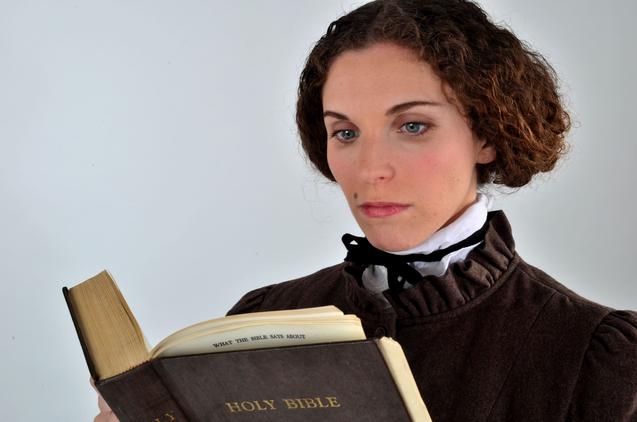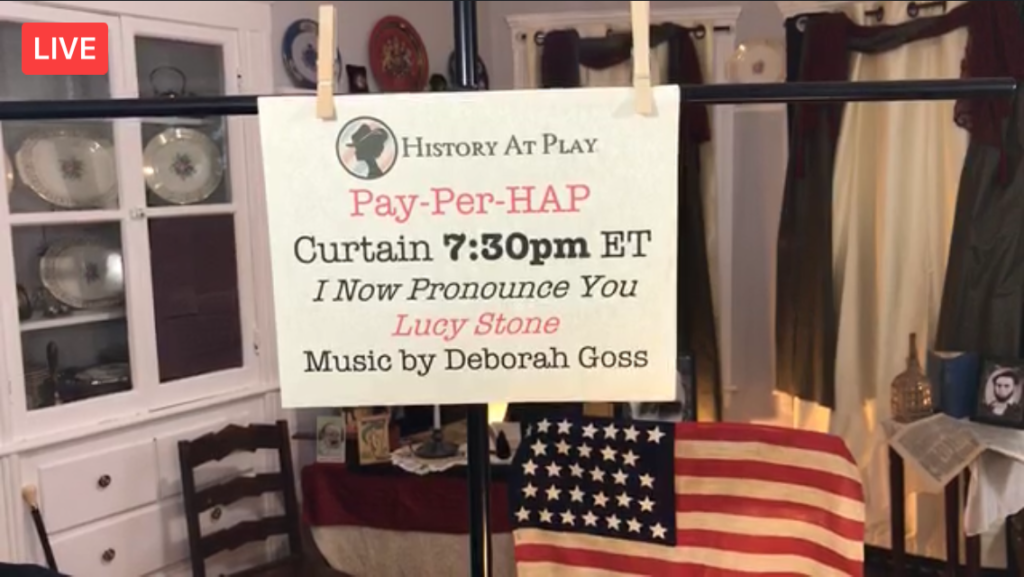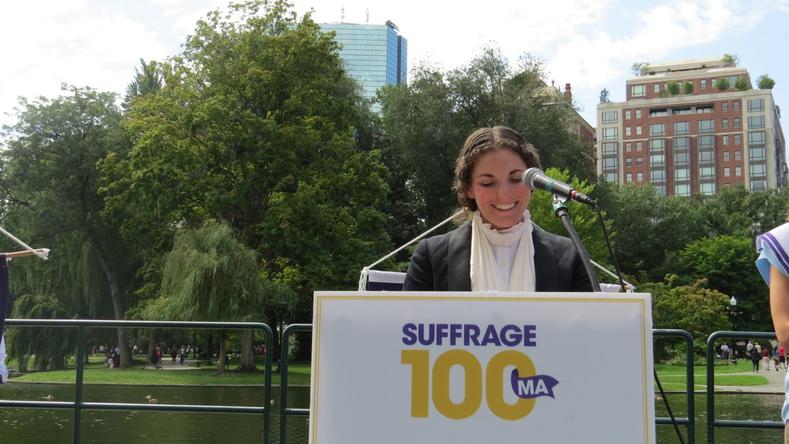
Image via http://www.judithkalaora.com/i-now-pronounce-you-lucy-stone.html. Kalaora looked as luminous during the performance as she does here.
Presented by History at Play’s Pay-Per-Hap program
Researched, written, produced and performed by Judith Kalaora
Music by Deborah Goss
Friday, August 21, 7:30 – 9 PM
Livestreamed on Facebook
History At Play on Facebook
An Upcoming Schedule of Performances
Critique by Kitty Drexel
Apologies to Judith Kalaora and the History At Play team for the tardiness of this post – we were without internet for five days and unable to post this review.
FACEBOOK LIVE — The one-woman show, I Now Pronounce You Lucy Stone, began with a light, off-camera folk song performance minutes before 7:30 PM on August 21. Stone’s (Judith Kalaora) vibrant, full-bodied voice was heard as she puttered just offstage. As we learned, she had a lot to prepare for. MA native Lucy Stone fought for women’s right to vote in the 1840s. She nearly did it too. Unfortunately for all female-identifying individuals, women would have to wait another 80 years before wringing the privilege from men’s totalitarian grasp.
I Now Pronounce You Lucy Stone celebrates the life story of the Massachusetts heroine famous for being the first woman to earn a college degree (Oberlin College), use her birth name after marriage, deliver abolitionist speeches in public, and organize the first National Women’s Rights Convention in Worcester among other conquests. She was a staunch feminist before there was a word for it. The show tracks her marriage to Henry Blackwell and her separation from Elizabeth Cady Stanton and Susan B. Anthony. Her greatest wish was to achieve the right to vote in all elections.

An image of the set from Aug. 21 taken by the Queen for this review.
Stone introduces herself in a timeless dining room with white walls, cabinetry, and curtains that tastefully scream 19th Century New England. The camera focuses tightly on a pleasant table set for two with an American flag draped in front of it. It looks as if one could sit down to after-dinner tea with comfort. We are welcome in this home.
The set transports the viewer to a time when women existed as little more than property. Kalaora makes good use of the stage. Despite cramped quarters, she looks at home on it. Never do we think she’s somewhere unfamiliar.
I am new to the work of History At Play but I can sincerely say that this production is one of a kind. Its entertainment value is preceded only by its educational value. The many instances in which Stone flouted society’s restrictions for the benefit of womenkind are bravely but humbly enacted in Kalaora’s script and performance. Kalaora’s thoroughly researched script highlights Stone’s fascinating life. It references and quotes Stone’s public speeches. Kalaora isn’t delivering a performance so much as successfully delivering a Ph.D. thesis to a panel of anonymous professors.

WSSC Women’s Equality Day 2018 event at Boston Public Garden Swan Boats. Image via http://www.judithkalaora.com/i-now-pronounce-you-lucy-stone.html
Kalaora’s stamina is impressive. For over an hour, she embodies this emotionally conservative but politically righteous heroine of civil rights. Whether she speaking to the camera or to an imaginary partner off-screen, Kalaora maintains a high energy level. Her connection to the camera is unflinching; she never drops focus.
Some of my favorite moments of the evening came after the performance. Kalaora first answered questions as Lucy Stone from Facebook Live. Her character remained strong but she relaxed just a bit. She regaled us with even more historical information that didn’t make it into the show.
Kalaora then answered questions from Facebook as herself. When a male asked if Stone’s husband Mr. Henry Blackwell received threats for his involvement in women’s suffrage, Kalaora masterfully redirected the question by saying that everyone involved received threats. She didn’t let the Q&A session go off topic. Kalaora knows that a good ally doesn’t pull focus away from the cause; she keeps the focus on the issues that matter. As we celebrate the 100 anniversary of women’s right to vote, the focus should remain solidly on women’s rights.
